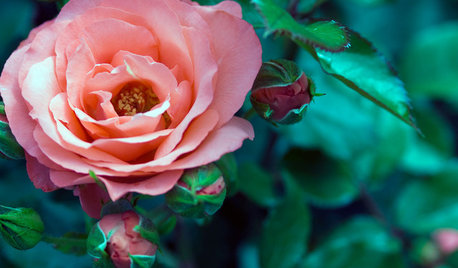More questions for the experienced rose gardeners....
leezen4u
11 years ago
Related Stories

FEEL-GOOD HOMEThe Question That Can Make You Love Your Home More
Change your relationship with your house for the better by focusing on the answer to something designers often ask
Full Story
GARDENING GUIDESNo-Regret Plants: 5 Questions Smart Shoppers Ask
Quit wasting money and time at the garden center. This checklist will ensure that the plants you're eyeing will stick around in your yard
Full Story
FRONT YARD IDEASWelcome Edibles Into the Front Yard for Fresh Food and More
Give your front yard design a boost and maybe even make new friends by growing fruits and vegetables
Full Story
GARDENING GUIDESWe Bust 4 More Native Plant Myths
Have you been taken in by these fallacies about gardening with native plants?
Full Story
GARDENING GUIDESLearn the Secret to Bigger and Better Roses
Grow beautiful roses using both ordinary and unusual soil amendments
Full Story
REMODELING GUIDESConsidering a Fixer-Upper? 15 Questions to Ask First
Learn about the hidden costs and treasures of older homes to avoid budget surprises and accidentally tossing valuable features
Full Story
SELLING YOUR HOUSE15 Questions to Ask When Interviewing a Real Estate Agent
Here’s what you should find out before selecting an agent to sell your home
Full Story
MOST POPULAR8 Questions to Ask Yourself Before Meeting With Your Designer
Thinking in advance about how you use your space will get your first design consultation off to its best start
Full Story
REMODELING GUIDESSurvive Your Home Remodel: 11 Must-Ask Questions
Plan ahead to keep minor hassles from turning into major headaches during an extensive renovation
Full Story
GREEN BUILDINGConsidering Concrete Floors? 3 Green-Minded Questions to Ask
Learn what’s in your concrete and about sustainability to make a healthy choice for your home and the earth
Full Story







jerijen
harmonyp
Related Professionals
Clark Landscape Architects & Landscape Designers · Rossville Landscape Architects & Landscape Designers · Seabrook Landscape Architects & Landscape Designers · Canton Landscape Contractors · Clermont Landscape Contractors · Salem Landscape Contractors · Concord Landscape Contractors · Addison Landscape Contractors · Bainbridge Island Landscape Contractors · Goodlettsville Landscape Contractors · Hoffman Estates Landscape Contractors · Leicester Landscape Contractors · West Orange Landscape Contractors · Palos Hills Landscape Contractors · Tyngsboro Landscape ContractorsKarolina11
leezen4uOriginal Author
roseseek
jerijen
leezen4uOriginal Author
michaelg
leezen4uOriginal Author
Poorbutroserich Susan Nashville
jerijen